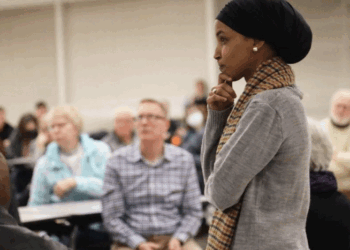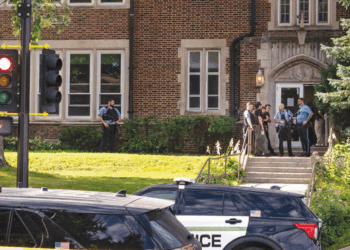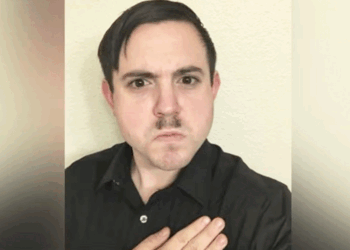At first glance, it looked like a case of astute police work. Four ex-convicts, three of them recent jailhouse converts to Islam, were caught in the act of planting bombs at two New York City synagogues last week. They also were in possession of a surface-to-air missile, which they ostensibly planned to use in downing a military jet.
Leaders of the organized Jewish community in New York hailed the arrests of the Bronx bombers. Various leaders of national Jewish groups also issued statements. For example, Rabbi Eric Yoffie, president of the Union for Reform Judaism, and Rabbi David Saperstein, director of the Religious Action Center for Reform Judaism, issued a statement that commended the FBI “for its dedicated and impressive work in thwarting the plans of four would-be terrorists who intended to carry out potentially devastating attacks on Riverdale Temple and the Riverdale Jewish Center. We are immensely thankful to you, to these courageous and talented agents, and to the entire Bureau for acting undercover to infiltrate the group and monitor its activities, thereby ensuring that the terrorists’ plans could not come to fruition.”
Indeed, the wannabe terrorists from Newburgh, a town an hour north of New York City, were in cahoots with an FBI informant who provided them with fake C-4 plastic explosives and a dummy Stinger surface-to-air missile. A news report stated that the pistol carried by one of the Bronx bombers also was rendered inoperable by the FBI informant.
Apart from the accolades of Jewish officials, representatives of law enforcement agencies and politicians, something more ethically ambiguous is taking place with the Newburgh Four, and in other similar cases.
As an Associated Press story from New York on Sunday noted: “It usually starts with a snitch and a sting operation, followed by a great deal of publicity and controversy.” The “snitch” in the Bronx bombing plot, according to the AP story, is a Pakistani immigrant who became an informant for the FBI in order to avoid deportation.
The AP also mentions that in most post-9/11 incidents, like the foiled plot to bomb synagogues in the Bronx, “accusations soon followed that the stings were overblown operations that entrapped hapless ne’er-do-wells.”
The federal authorities contend that these arrests save lives, but Bruce Schneier, who writes on security and security technology, told AP: “Most of these guys don’t get tried. These are not criminal masterminds, they’re idiots. There’s huge fanfares at the arrest, and then it dies off.”
The tabloid press in New York has been replete with stories over the past week about how one of the bomb plotters spent his days before getting busted smoking marijuana and playing video games. In court, he told the judge, “I smoke it regularly,” then reassuringly added, “I understand everything you are saying.” The New York Daily News reported that one of the Newburgh men had been declared to be a paranoid schizophrenic.
So, many now question — in the case of the Newburgh group, and other cases of allegedly violent malcontents — the extent of government involvement in facilitating these crimes.
“Is the FBI manufacturing terrorists? What would happen if they were left on their own? They fall into the hands of an FBI informant, and then they get helped and egged on,” Schneier told AP.
Coleen Rowley served nearly 24 years in the FBI. She was named a Time magazine person of the year, in recognition of her role as a whistleblower in the bungled FBI investigation of Zacarias Moussaoui, a figure in the 9/11 terrorist attacks.
During a telephone conversation with the AJW this week, Rowley discussed a “series of terrible scandals at the FBI” involving the mishandling of informants. In some cases, informants for the FBI were organized crime bosses engaged in murder and other felonious activities. She said that FBI higher-ups put “way too much pressure” on agents to recruit such “top echelon” informants, which resulted in a lack of compliance with FBI regulations governing the management of informants.
In the case of the Newburgh group — and with the local case of the Texas Two, the young activists who were recently sentenced to prison terms in Minneapolis for possession of Molotov cocktails during the Republican National Convention last year — Rowley sees that the legal standard regarding “entrapment,” or inducing a crime, has become fuzzier in the post-9/11 era. FBI officials are supposed to determine that someone has to have a “predisposition” to commit a crime before an informant relationship develops, Rowley explained, citing the direction of the 8th Circuit Court.
“If you hire people to get people to do crimes, you can get a lot of people to commit crimes,” Rowley commented. “It makes no sense to do that.”
“If the FBI decides — for political purposes, for PR purposes — to prey on the weak, the mentally ill, it could get lots and lots of people to do bad things,” she added. “We already have prisons that are just busting, full of people. It doesn’t serve a purpose if you’re crossing that line and getting people to commit crimes that they are not otherwise predisposed to do.”
Rowley also pointed out that the FBI agent involved in the case of the Bronx bombers has had a “complete fiasco of a career.” A story on a Village Voice blog last week reported that FBI Special Agent Robert Fuller, “whose name appears at the top of the federal criminal complaint in the case [of the Newburgh Four], had a hand in the FBI’s failure to nab two of the 9/11 hijackers, had one of his informants set himself on fire in front of the White House, and was involved in misidentifying a Canadian man [Maher Arar] as a terrorist, leading to his secret arrest and torture — a case that is now the subject of a major lawsuit.”
We would like to think that our law enforcement agencies are proactive and protective of the Jewish community, and of all groups in the greater society. However, in the post-9/11 environment there is a worrisome trend among law enforcement officials to manufacture threats for their own aggrandizement and personal power. In the New York case, we will see how the case plays out in court; but it is conceivable that the four stooges in custody did not represent a serious terrorist threat to the social order. If limited resources are being devoted to gaming the system and manufacturing crimes, then there could be real predators escaping detection.
— Mordecai Specktor / editor [at] ajwnews [dot] com
(American Jewish World, 5.29.09)




















Comments 0